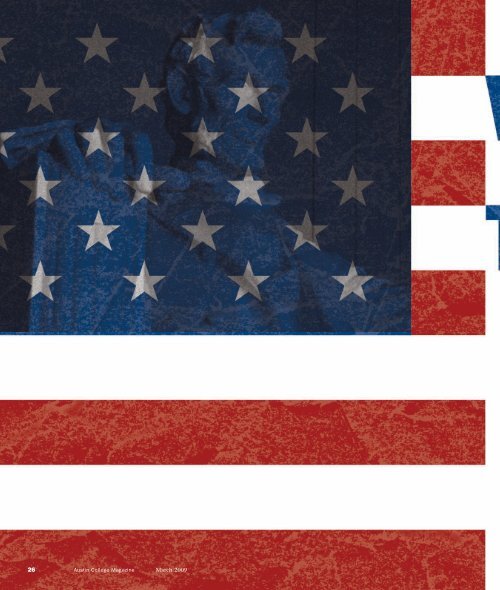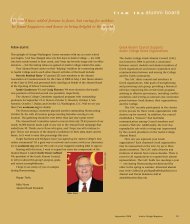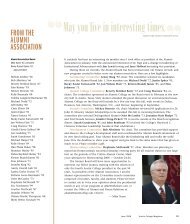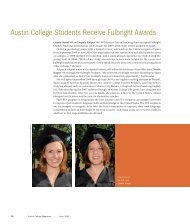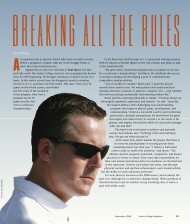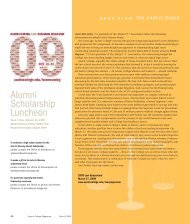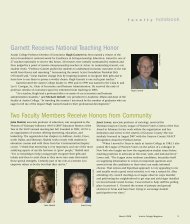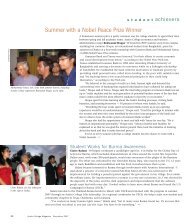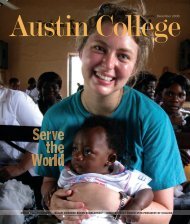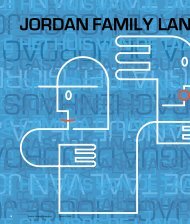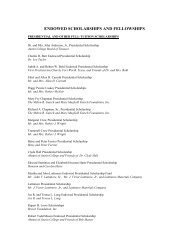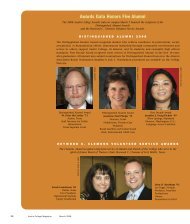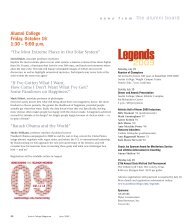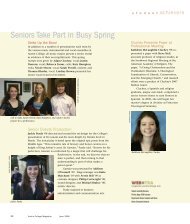view pdf format - Austin College Magazine
view pdf format - Austin College Magazine
view pdf format - Austin College Magazine
Create successful ePaper yourself
Turn your PDF publications into a flip-book with our unique Google optimized e-Paper software.
26 <strong>Austin</strong> <strong>College</strong> <strong>Magazine</strong> March 2009
y Dara McCoy<br />
Every presidential<br />
inauguration is<br />
historic, but the<br />
inauguration of<br />
Barack Obama as the<br />
44th president of the<br />
United States was an<br />
event of worldwide<br />
interest, extensive<br />
media coverage, and<br />
impressive citizen<br />
participation.<br />
The combination of the significance of the nation’s<br />
first black president’s official step into office; the<br />
convergence of more than a million flag-waving<br />
spectators upon the Washington National Mall;<br />
performances by some of the world’s most<br />
acclaimed musicians; and optimistic anticipation<br />
of Obama’s promise of change resulted in a celebration of<br />
enormous proportion.<br />
There amidst the millions of onlookers were a number of<br />
<strong>Austin</strong> <strong>College</strong> students staking their claim on the historic<br />
moment and the opportunity to stand as witness to the moment<br />
of change. Of course, millions of people did not vote for Obama<br />
and perhaps felt defeat at his election. But the inauguration<br />
celebration seemed to transcend partisan politics. “All around me<br />
I could feel the energy circulating through the streets as we<br />
prepared for our next president to take office,” said Rachel Mims ’11, an international<br />
relations major at <strong>Austin</strong> <strong>College</strong>, who had volunteered for the Obama campaign. “It no<br />
longer mattered if you supported McCain or Obama, everyone was excited to have Obama<br />
take his place and begin the process of the much-needed change for this nation.”<br />
For the 2009 JanTerm, 29 <strong>Austin</strong> <strong>College</strong> students who traveled to Washington, D.C.,<br />
for the “Leadership in a New Era” course at the Osgood Center for International Studies<br />
were able to witness the inauguration firsthand. The course was taught by Shelton<br />
Williams, <strong>Austin</strong> <strong>College</strong> professor emeritus of political science and president of the<br />
Osgood Center.<br />
March 2009 <strong>Austin</strong> <strong>College</strong> <strong>Magazine</strong> 27
COURTESY PHOTOS<br />
Alissa Luthe<br />
LIVE FROM D.C.<br />
“The atmosphere at the inauguration was unlike anything I had ever experienced,” said Mims.<br />
“Even though we had stood in 20 degree weather since 5 a.m., everyone was still so excited<br />
and happy to be there that nothing else mattered. A local told me that people in Washington,<br />
D.C., never smile at complete strangers, but on January 20, everyone was eager to talk to the<br />
people to their left and right to learn how far they had traveled and how excited they were<br />
for the celebration to begin.”<br />
Alissa Luthe ’09, a communication studies major, was in Washington, D.C.,<br />
interning with Congressman Ralph Hall in a Career Study Off-Campus for<br />
JanTerm. Luthe volunteered with the Young Republican’s Club of Grayson<br />
County during the 2008 election. “From a humanitarian aspect, witnessing the<br />
first black president be sworn into office was a great experience,” Luthe said. “It<br />
was wonderful to feel the sea of optimism and joy among the millions attending<br />
the inaugural ceremonies. It reinvigorated the Martin Luther King, Jr., ‘I Have a<br />
Dream’ speech and made many believe that barriers can be overcome and dreams<br />
can be achieved.”<br />
Jeff Ridenour ’11, a double major in political science and communication<br />
studies, was in D.C. with the Congressional Youth Leadership Council for the<br />
University Presidential Inaugural Conference. The council brought 15,000<br />
middle school, high school, and college students into the city, creating the<br />
largest youth group in attendance at the inauguration, Ridenour said.<br />
“The inauguration was an indescribable and wonderful experience,” Ridenour said. “I felt,<br />
as I think all of the two million people there did, like I was part of history. I was there because<br />
my voice was heard, and I was part of a remarkable change and revolution of our nation,”<br />
Ridenour added. “I have never seen so many people, from all different paths and backgrounds<br />
of life, come together to share the joy and success of our nation and a time of great change,<br />
diversity, and progression.”<br />
“Being at the inauguration was<br />
an incredible experience,” said<br />
Stefanie Faith ’11. “Afterward,<br />
everyone asked me to tell them<br />
everything about it, and I tried<br />
my best, but you can’t explain<br />
the moment standing with two<br />
million people all there for one<br />
purpose, to witness history.”<br />
LEADERSHIP IN A NEW ERA<br />
While the January 20 inauguration and ensuing celebration were certainly highlights of the<br />
2009 JanTerm for most <strong>Austin</strong> <strong>College</strong> students in D.C., the term offered a very educational<br />
experience for the participants in the “Leadership in a New Era” course. Students heard from<br />
Congressional liaisons, legislative directors, CEOs, and other experts concerning political<br />
leadership transition for the new administration.<br />
Students attended seminars concerning foreign policy, energy, healthcare, the<br />
administration’s relationship with Congress, and other challenges facing the incoming<br />
administration. Williams said he tried very hard to give students a balanced <strong>view</strong> of all the<br />
issues by inviting speakers who represented Republican and Democrat points of <strong>view</strong>.<br />
The JanTerm allowed students to take advantage of their visit in<br />
one of the country’s most historic cities by touring sites such as the<br />
White House, Newseum, Capitol Hill, the Holocaust Museum, and<br />
the International Spy Museum. Students also received exclusive tours<br />
of the Israeli and Chinese embassies. “The advantage we have at the<br />
Osgood Center is that we’re physically located right in the middle of<br />
the think tank government operations of the city,” Williams said.<br />
28 <strong>Austin</strong> <strong>College</strong> <strong>Magazine</strong> March 2009
YOUTH MOVEMENT<br />
Surreal, unimaginable, wonderful, electric, and yes, even spiritual were words used by <strong>Austin</strong><br />
<strong>College</strong> students attempting to capture the experience of attending the inauguration. The<br />
vast majority of students, no matter their political leanings, took an impressive sense of<br />
ownership in the 2008 election. They were first-time voters and very aware of the fact that<br />
the winner would be leading the country when they graduate.<br />
“Like many students, this was the first presidential election that really impacted me,” said<br />
Merritt O’Boyle ’11, an English and psychology double major. “The issues on the table are<br />
so much more real to me now. In two short years, I may be out of school for good and issues<br />
like health insurance strike close to home. The president will be my president in a way<br />
different from ever before, now that I’m a legal adult.”<br />
Despite voting in Texas, a state that Republican John McCain carried, O’Boyle didn’t feel<br />
her vote for Obama was marginalized in any way. “I had been able to vote for two years and<br />
had exercised this right in the gubernatorial race and others, but something about deciding<br />
who to place in charge of your country is just empowering,” she said. “It wasn’t necessarily<br />
that my vote would be the deciding factor; it meant a lot to me personally to be able to say<br />
that I voted for him.”<br />
The sense of hope, inclusion, and empowerment in the political process felt<br />
by the next generation just might be the most impressive change of all of the<br />
2008 election. “This is the first election I can cite that the candidate whom the<br />
vast majority of young people supported actually won,” said Abbas Ravjani<br />
’04, who was a Texas delegate for Obama at the Democratic National<br />
Convention and is in his final year of law school at Yale University. “President<br />
Obama was a candidate that related to our generation — from staying up-todate<br />
on his Blackberry to taking time out to shoot hoops, he connected with a<br />
wide range of new voters in an unprecedented fashion. How President Obama<br />
harnesses this hunger from young people will be one of his defining legacies.”<br />
March 2009 <strong>Austin</strong> <strong>College</strong> <strong>Magazine</strong> 29
Reaching a New Generation<br />
It was hard to miss students’ excitement on campus in the days leading up to and following<br />
Obama’s inauguration. Whether it was his own youth — at 47, Obama became the fifth youngest<br />
president ever elected — a fist-bumping image, or savvy use of new media, Obama connected with<br />
the nation’s young people, perhaps more effectively than any presidential candidate.<br />
The Obama team created a modern, technology “machine” that gave Obama a presence on<br />
myriad social networks; sent — and responded to — innumerable email and text messages (with a<br />
reported email database of 10 million); filmed videos, offered ringtones; posted thousands of hours<br />
of content on YouTube; and built BarackObama.com, with its MyBarackObama social network,<br />
which according to the Washington Post, signed on more than a million participants. This machine<br />
mobilized volunteers, solicited funds, and inspired millions. Content could be loaded onto cell<br />
phones, accessed online, and transmitted instantly.<br />
“For me in my busy day, the Internet was the fastest and most accessible way to stay posted on<br />
the candidates, the election process, and polls,” said Jeff Ridenour ’11. “I believe this campaign’s<br />
use of the Internet played a significant role in updating and keeping the youth of our nation<br />
involved and interested.”<br />
Rachel Mims ’11 noticed campaigning done through Facebook and MySpace — popular online<br />
social networking Web sites that she said most young people log into at least once a day. “The use<br />
of the Internet in the 2008 election was one of the best moves made in campaigning,” she said. “I’m<br />
one of those million young adults that found out more about the candidates through groups located<br />
on Facebook. This new use of the Internet has changed the way campaigning will be done forever.”<br />
Merritt O’Boyle ’11 said she used the Internet to share her <strong>view</strong>s and debate with others on<br />
political issues and candidates during the campaign. “The Internet is an incredibly effective way to<br />
reach out, especially to young adults,” she said. “I<br />
definitely used the Internet to get involved and let<br />
my voice be heard. The Internet played a big part,<br />
and I’m not sure Obama could’ve raised the<br />
volunteer power or funds he did without it.”<br />
More people gave to the Obama campaign than<br />
any campaign in history, according to ABC News<br />
reports. Team Obama estimated its total number of<br />
donors to be just shy of four million. According to<br />
the Center for Responsive Politics, the Obama<br />
campaign raised more than $650 million in<br />
individual donations (88 percent of his total<br />
campaign funds). Part of Obama’s success in<br />
reaching not only the individual vote, but also the<br />
individual pocketbook stems from his campaign’s<br />
ability to take the grassroots movement online.<br />
Editor’s Note: This article is not intended to make any political<br />
statement or endorsement, but to share students’ experiences as<br />
they participated in the historic culmination of the first<br />
presidential election in which most had participated.<br />
30 <strong>Austin</strong> <strong>College</strong> <strong>Magazine</strong> March 2009
Obama Mania!<br />
O<br />
bama’s rise was meteoric and has made him a presidential celebrity perhaps not seen since<br />
John F. Kennedy. In the days before the inauguration, D.C. memorabilia shops were cashing<br />
in on the euphoria, selling record numbers of Obama bobbleheads, calendars, belt buckles,<br />
t-shirts, and other merchandise.<br />
In January, media outlets reported that bids<br />
opened at $100,000 on eBay for a 2005 Chrysler<br />
300C formerly owned by Obama, though the car’s<br />
actual value is closer to $15,000.<br />
Even sports teams have jumped on the Obama<br />
bandwagon. The Brooklyn Cyclones, a minor<br />
league baseball team, announced it will change its<br />
name to the “Baracklyn” Cyclones in a June ticket<br />
sales promotion.<br />
“Being in the city before the inauguration was<br />
amazing,” said Stefanie Faith ’11, a history major<br />
who participated in the JanTerm course in D.C.<br />
“You could feel the energy and excitement every<br />
time you stepped outside. Obama mania hit the<br />
streets, and I was a part of it.”<br />
PHOTO BY KATIE McCOY<br />
<strong>Austin</strong> <strong>College</strong> students celebrated at the campus<br />
Presidential Inauguration Ball in January.<br />
Mr. Kirk Goes to Washington<br />
<strong>Austin</strong> <strong>College</strong> alumnus and senior trustee Ron Kirk ‘76 has been selected by President Barack Obama to<br />
serve as the United States Trade Representative. This Cabinet-level appointment is the first to be held by<br />
a graduate of <strong>Austin</strong> <strong>College</strong>.<br />
“<strong>Austin</strong> <strong>College</strong> is proud of Ron’s success in Texas, and I am sure he will be equally successful as he works<br />
with world leaders,” said Oscar C. Page, president of <strong>Austin</strong> <strong>College</strong>. “Ron’s leadership at the state and<br />
local level is impressive, and these experiences have prepared him well to serve as the U.S. Trade<br />
Representative for the new administration.”<br />
Kirk’s appointment was announced by Obama on December 19 at a press<br />
conference in Chicago. “As mayor of Dallas, Ron helped steer one of the world’s largest<br />
economies,” Obama said. “During his tenure as mayor, Ron brought different groups<br />
together to create jobs, invest in the community, and spur economic growth.” In<br />
accepting his nomination, Kirk said that “trade can help us create jobs at home and<br />
encourage development abroad.”<br />
A native of <strong>Austin</strong>, Texas, Kirk came to <strong>Austin</strong> <strong>College</strong> in 1972, graduating in 1976<br />
with a degree in political science and sociology. Kirk then attended law school at the<br />
University of Texas, where he earned his J.D. degree in 1979. Soon after, he began<br />
working for U.S. Senator Lloyd Bentsen in Washington, D.C., which was followed by<br />
political positions as Dallas assistant city attorney, Texas secretary of state, and Dallas<br />
mayor. At the time of the announcement, he was a partner at the Dallas offices of the<br />
Houston-based law firm of Vinson & Elkins.<br />
Ron Kirk<br />
COURTESY PHOTO<br />
March 2009 <strong>Austin</strong> <strong>College</strong> <strong>Magazine</strong> 31


